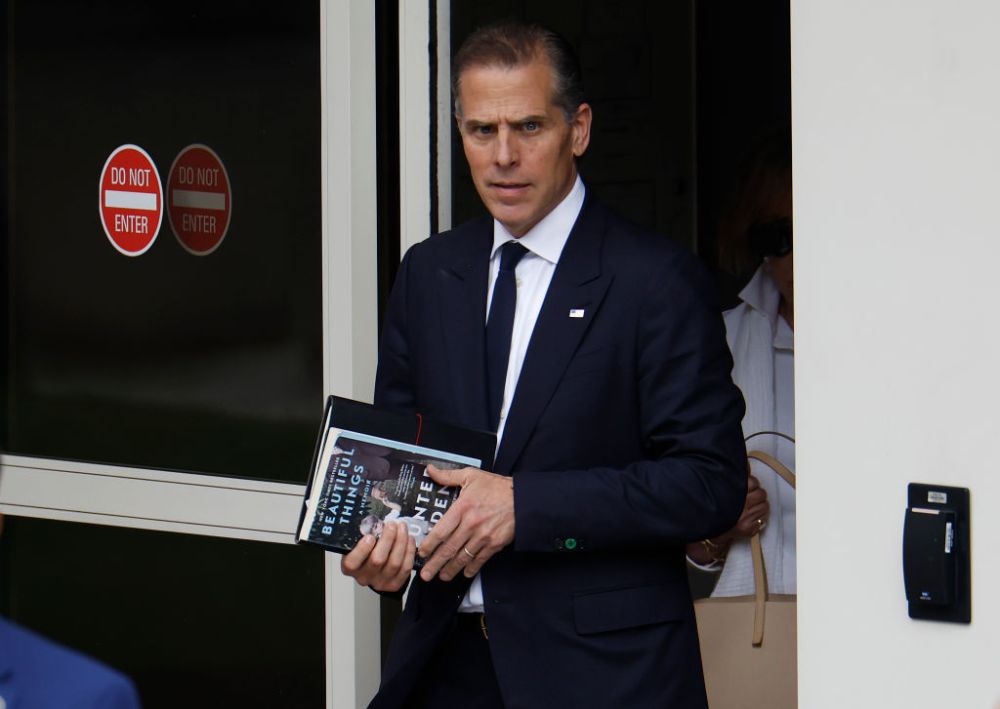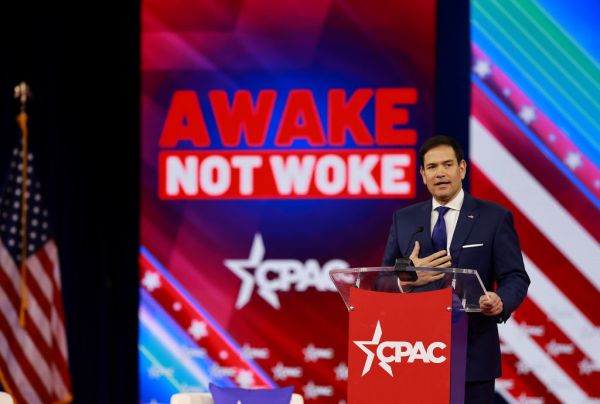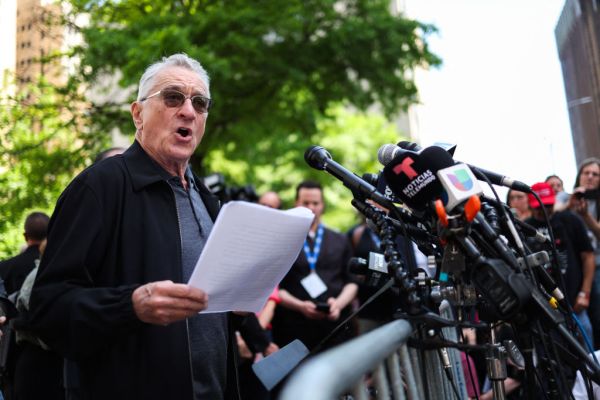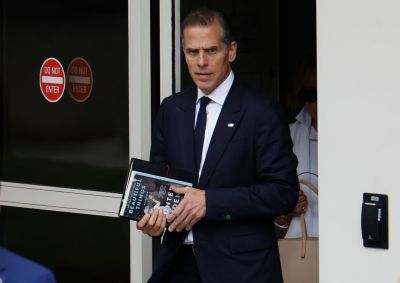The president’s son was convicted of three felonies on Tuesday, and his party was quietly ecstatic about it.
It was the opposition party that was crestfallen by the verdict.
The strange rooting interests in Hunter Biden’s trial on gun charges in Delaware reflect how deranged our politics has grown under the influence of populism. The right is now compelled to spin obvious institutional successes as failures while the left is compelled to spin obvious failures as successes.
The funny thing about Hunter’s conviction is that it gave each side ammunition for its position.
In that sense, and in several others, it resembled Donald Trump’s conviction in Manhattan last month. In both cases, it seemed likely that the defendant wouldn’t have been charged if not for his political celebrity. In both cases, political sympathizers bankrolled the defense. In both cases, the prosecution engaged in irregularities that deepened suspicions of a secret political motive. And in both cases, despite being put through a legal wringer over offenses that just weren’t very serious, the defendant foolishly refused to seek a plea deal.
That was to be expected in Trump’s case, as he’s incapable of admitting fault. But it was lunacy for Hunter Biden to go to trial once his initial plea agreement fell apart, as our own Sarah Isgur recently explained in an op-ed. Biden had no defense to the charges that he lied about his addiction when purchasing a firearm, and he must have recognized that a trial would create an emotional and political ordeal for his family.
Selfish as ever, he insisted on one anyway. One can sympathize with him for his addiction while recognizing the truth of what National Review wrote on Wednesday about the verdict: “Hunter has been given singular advantages and opportunities. He has squandered them—a living, breathing wrecking ball of arrogance, substance abuse, betrayal of his duties to his children, not to mention trading his father’s political influence for big paydays from agents of corrupt and anti-American regimes.”
That’s another thing the two defendants have in common. They’re both sons of immense privilege and yet, in starkly different ways, grew up to be lowlifes anyway.
And now here we are, with Democrats thrilled to see both men convicted and Republicans just as displeased. Both sides are wrong, as they often are.
Hunter Biden’s conviction was not an institutional success. On the contrary, the Justice Department managed the neat trick of being too easy on him and too hard.
According to a New York Times report published last year, at one point in 2023 special counsel David Weiss “appeared willing to forgo any prosecution of Mr. Biden at all, and his office came close to agreeing to end the investigation without requiring a guilty plea on any charges.” Eventually Weiss changed his mind, but not because new evidence of Hunter’s guilt emerged.
What changed was the politics. Per the Times, Weiss got spooked when two IRS whistleblowers came forward and accused the DOJ of slow-walking the tax case against Hunter Biden. With that allegation of impropriety now hanging over his head, Weiss suddenly demanded that Hunter plead guilty to the tax charges pending against him.
In a principled law enforcement institution, the terms of plea deals shouldn’t depend on bad publicity.
Even so, Weiss’ office remained willing to let Biden off without prison time. The deal the two sides eventually negotiated required him to plead guilty to misdemeanor tax charges and accept a “deferred prosecution” on the gun charges—but that deal was rejected by Judge Maryellen Noreika. In questioning lawyers for the two sides, Noreika discovered that Biden believed the terms of the deal immunized him from future charges related to his many dubious overseas business dealings whereas the DOJ insisted it did not.
Again, suspicions of impropriety hung over Weiss. Republicans speculated that the Justice Department had tried to pull a fast one in the plea deal by quietly gifting the president’s son with an all-purpose “get out of jail free” card but was foiled when Noreika exposed it. So Weiss did the same thing he did the first time his office received bad publicity for going easy on Hunter: He went hard on him, dragging him to trial on the tax and gun charges.
Tuesday’s conviction was the result. Listening to Democrats on Capitol Hill celebrate the verdict as a reminder that “no one is above the law,” you would never have known that the DOJ was prepared to let Hunter Biden off with the gentlest of wrist slaps—all but placing him above the law—until a federal judge and two IRS employees publicly embarrassed them over it.
Ironically, in their desperation to show that they hadn’t been unduly lenient with Biden, Weiss’ office ended up being unduly harsh. That’s because it’s unusual for the Justice Department to charge someone for lying about their drug addiction on a federal background-check form unless they’re also suspected of having committed more serious crimes. After nearly getting off effectively scot-free, Hunter Biden ended up on trial for a comparatively minor offense that likely wouldn’t have been brought against the average joe.
That’s another parallel with Trump. Prosecutors in New York charge people with falsifying business records all the time—but rarely if that’s the most serious offense they’ve committed, as was true in Trump’s case.
In short, in the course of a single prosecution, the president’s son was treated unusually well and unusually strictly by the agency his father oversees and likely for reasons related to public opinion, not to the evidence against him. Not a banner day for American institutions.
That’s not the only dubious element of the case either.
Last May, while Weiss’ office was busy trying to decide whether to strike a deal with Hunter Biden, Joe Biden declared on national television that “my son has done nothing wrong.” It’s not often that the supervising officer of a law enforcement agency publicly vouches for the innocence of a criminal defendant his agency is prosecuting.
It’s not often either that that supervising officer pays a personal visit to a key witness on the eve of trial. But that happened in this matter as well.
And thanks to “two people close to the president,” it was revealed by Politico a few months back that Joe Biden had “privately denounced how long the probe into his son was taking, telling aides and outside allies that he believed the stress could send Hunter Biden spiraling back into addiction.” How regularly does the attorney general open a newspaper and discover that his boss is unhappy with how he’s handling a particular pending case?
As you weigh the institutional merits of this case, consider too Hunter Biden’s curious decision not to accept a plea deal and instead to proceed to trial despite the open-and-shut nature of the gun charges against him. One wonders if he secretly believed that no jury in a Delaware court would convict a relative of Joe Biden’s, especially one with a compelling sob story about addiction. Hunter may have assumed that, at least in his father’s home state, he really was above the law.
That also resembles the Trump trial. In that case, the defendant suspected that his political notoriety guaranteed that a jury in a very liberal jurisdiction would convict him. In Hunter Biden’s case, the defendant seems to have suspected the same bias at work except in his favor. How nice to think that both of these very prominent Americans regard the institutional integrity of the jury system as so much political hackery.
In fact, one wonders whether Democrats would have sounded like this on Tuesday …
… if Trump had been acquitted in Manhattan and then Hunter Biden had been convicted. Do Alexandria Ocasio-Cortez and her colleagues “respect the judicial process” because they believe in that process, or do they respect it in these two cases only because that process happened to produce two outcomes that are, on balance, politically favorable to Democrats?
Because, as we’ve seen, the process in both prosecutions did not cover itself in glory.
One more thing. What of the possibility that Joe Biden will eventually pardon Hunter?
The president has stated for the record that he won’t do it but I simply don’t believe him. The day-to-day welfare of Hunter Biden is one of the consuming interests of his life and after November 5 he’ll never again need to worry what American voters think of him. I can’t imagine him allowing his perpetually fragile son to stew in a prison cell, even for a few months.
I think he’ll grant clemency. And when he does, he’ll ratify the Trumpist impulse to bestow criminal impunity on friends and cronies for no better reason than that they’re friends and cronies. A leader who means it when he says that “our justice system … literally is the cornerstone of America” wouldn’t dream of undermining public confidence in that system by handing out hall passes as filial favors.
What should we conclude about Joe Biden’s respect for institutions if, or when, he does?
Democrats are treating the institutional failure in Hunter Biden’s case as a success because his conviction strengthens their argument that Donald Trump’s conviction was just. It’s harder for Trump and his minions to accuse the justice system of partisan bias if the sitting Democratic president’s son is facing prison.
Apart from Joe Biden himself, most liberals will regard ongoing legal misery for Hunter Biden as a price worth paying if it helps convince swing voters that Trump was fairly convicted and is unfit to govern.
For the opposite reason, most Republicans are irritated by the verdict. “Many Trump allies had been secretly rooting for an acquittal,” the Times reported. “The talking points wrote themselves: It would have been yet more evidence that the United States justice system was rigged in favor of the Bidens and against the Trumps. Tuesday’s guilty verdict was inconvenient to that narrative.” Trump campaign staffers allegedly even discussed how much a “not guilty” verdict for Hunter might bring them in new donations from outraged populists.
To turbocharge their argument that the former president’s conviction in Manhattan was unfair, they needed another “unfair” outcome in Hunter Biden’s case. They didn’t get one.
Republicans are, of course, free to make any or all of the points I made above about how the justice system almost failed by letting Biden off unfairly easily. If not for Noreika, a Trump appointee, it probably would have. But to claim that the system almost failed would amount to claiming that it’s flawed, and populist critiques rarely bother with “flawed.”
It’s too restrained. A flawed system can be repaired and reformed through normal political channels, after all. And flaws can result from well-meaning mistakes rather than deliberate misconduct. David Weiss might have sought leniency for Hunter Biden initially not because he’s a liberal hack—he too was appointed by Trump, remember—but because, in point of fact, people who’ve committed the same offenses as Hunter are typically treated leniently.
The post-liberal narrative spun by populists rejects the idea that the liberal order is “flawed.” Their movement aims to usurp that order entirely with something more authoritarian, and the only way to build popular will for a project as ambitious as that is to insist that the system is corrupt, and irredeemably so.
It’s not flawed, it’s malign. It’s too rotten to be repaired. Nothing short of replacing it will do.
That belief explains how we ended up with this raft of insanity on Tuesday afternoon from eminent Trump toadies who had, rest assured, been praying harder than anyone outside the Biden family for Hunter’s acquittal:
Trump’s campaign made a similar point. “This trial has been nothing more than a distraction from the real crimes of the Biden Crime Family, which has raked in tens of millions of dollars from China, Russia and Ukraine,” spokesman Karoline Leavitt said in a statement.
A hallmark of conspiracy theories is that they’re unfalsifiable. When evidence emerges that undermines the theory, that evidence is incorporated and offered as further confirmation of the theory’s validity. The way the dregs of the MAGA brain trust coped with Hunter Biden’s conviction is a stellar example: A guilty verdict that undercut their claims about a “rigged system” was instantly converted into evidence that the system is more rigged than anyone thought, with evil genius Joe Biden orchestrating the conviction of his own son to distract from his own corruption.
The spin about a “distraction” will be the same, I assume, if the Biden administration successfully prosecutes a sitting U.S. senator from his own party, as it’s attempting to do at this very moment. Every example of the criminal justice system behaving evenhandedly in cases where politics figures significantly can and will be dismissed as a Potemkin prosecution designed to instill unwarranted public confidence in the legitimacy of the four criminal cases against Trump.
It’s ridiculous. But it’ll probably work.
According to a new CBS News poll, no less than 80 percent of Republicans believe that the charges on which Trump was convicted in Manhattan were filed because of “directions that came from the Biden administration.” That belief is awfully hard to reconcile with Hunter Biden’s conviction given that the DOJ answers directly to Joe Biden while the Manhattan district attorney does not—unless you resort, a la Charlie Kirk and company, to outlandish theories that the president wanted his son convicted for political reasons and connived somehow to ensure that he would be.
Soon the Republican position will be that the “deep state” wasn’t after Hunter Biden, it’s after you. He was just in the way.
It’s ridiculous, but it’ll probably work. When you have a consensus-building propaganda machine at your beck and call, you’d be amazed at the things you can get people to believe. The system is still rigged now that the president’s son is headed to prison, you see—more so than ever, really.
Right-wing messaging on Biden’s conviction is ultimately a matter of cope. Cope with respect to their own leader’s rampant criminality, of course, but also cope with the fact that House Republicans threw everything they had at proving Joe Biden’s corruption over the last 18 months and came up goose eggs.
They’re now attempting to convince their base that Hunter’s guilty verdict was designed to distract from a mega-scandal that their own representatives failed to substantiate despite having had ample resources and opportunity to do so. And the base will probably buy it. Along, perhaps, with a meaningful number of swing voters.
It would be nice to think that Hunter Biden’s conviction will boost public confidence in the merits of Trump’s conviction but I’m too cynical for that. In the end, I think the only good things to come from this matter will be the enjoyable parodies of memes that circulated after Trump was found guilty and the slight chance that Biden’s conviction will be reversed on Second Amendment grounds.
If you think the partisan politics of the verdict are scrambled now, wait until that decision is handed down.
In the meantime, for the foreseeable future, we’ll be stuck in bizarro land watching left-wingers strain to defend the integrity of criminal convictions while “law and order” right-wingers strain to impugn them. Lord, let me live long enough to see the populist era end.







Please note that we at The Dispatch hold ourselves, our work, and our commenters to a higher standard than other places on the internet. We welcome comments that foster genuine debate or discussion—including comments critical of us or our work—but responses that include ad hominem attacks on fellow Dispatch members or are intended to stoke fear and anger may be moderated.
With your membership, you only have the ability to comment on The Morning Dispatch articles. Consider upgrading to join the conversation everywhere.